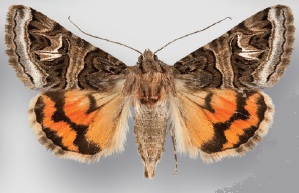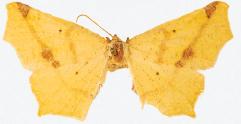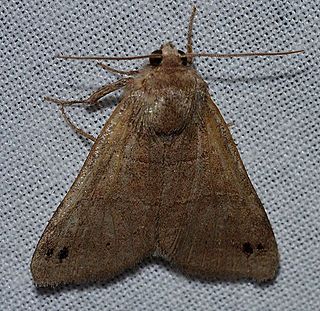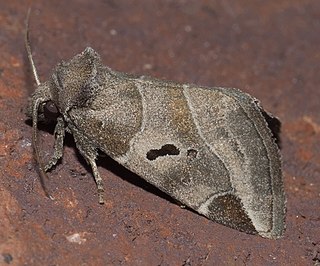
Hesperia, the branded skippers, is a Holarctic genus in the skippers (Hesperiidae) butterfly family. Most species are endemic to North America, Hesperia comma is widespread throughout the region. H. florinda is endemic to temperate eastern Asia. H. nabokovi is endemic to Hispaniola.

The Adelidae or fairy longhorn moths are a family of monotrysian moths in the lepidopteran infraorder Heteroneura. The family was first described by Charles Théophile Bruand d'Uzelle in 1851. Most species have at least partially metallic, patterned coloration and are diurnal, sometimes swarming around the tips of branches with an undulating flight. Others are crepuscular and have a drab coloration. Fairy longhorn moths have a wingspan of 4–28 millimeters, and males often have especially long antennae, 1–3 times as long as the forewing.

Eupterotidae is a family of insects in the order Lepidoptera with more than 300 described species.

Colias is a genus of butterflies in the family Pieridae. They are often called clouded yellows in the Palearctic and sulphurs in North America. The closest living relative is the genus Zerene, which is sometimes included in Colias.

Brachodidae is a family of day-flying moths, commonly known as little bear moths, which contains about 135 species distributed around much of the world. The relationships and status of the presently included genera are not well understood.

Apantesis is a genus of tiger moths in the family Erebidae first described by Francis Walker in 1855. They are found in North and Central America.

Cycnia is a genus of tiger moths in the family Erebidae. The genus was erected by Jacob Hübner in 1818.

Speyeria, commonly known as greater fritillaries, is a genus of butterflies in the family Nymphalidae commonly found in North America, Europe, and Asia. Some authors used to consider this taxon a subgenus of Argynnis, but it has been reestablished as a separate genus in 2017.

Virbia is a genus of tiger moths in the family Erebidae. The genus was erected by Francis Walker in 1854.

Drasteria is a genus of moths in the family Erebidae.

Antepione is a genus of moths in the family Geometridae, the geometer moths. The genus was described by Packard in 1876. They occur in North and Central America.

Phyciodes, the crescents or crescent spots is a genus of butterflies of the subfamily Nymphalinae in the family Nymphalidae.

Idmon is a genus of grass skippers in the family Hesperiidae.
Cissusa indiscreta, the indiscreet cissusa moth, is a species of moth in the family Erebidae. The species is found from British Columbia, south to California and in the south-west from Arizona to central Colorado. The habitat consists of oak woodlands and mixed hardwood forests.

Cissusa spadix, the black-dotted brown moth, is a species of moth in the family Erebidae. The species is found from Ontario and Quebec, south through most of the United States, to Arizona and Georgia.

Oligocentria is a genus of moths in the family Notodontidae, the prominents.

Stiriinae is a subfamily of owlet moths in the family Noctuidae. There are more than 20 genera and 130 described species in Stiriinae.

Argynnis is a genus of butterflies in the family Nymphalidae, one of several groups known as "fritillaries".

The Melipotini are a tribe of moths in the family Erebidae.
Cissusa valens, the vigorous cissusa moth, is a species of moth in the family Erebidae. It is found in North America, where it has been recorded from Utah east to Colorado, south to western Texas and west to Arizona.

















